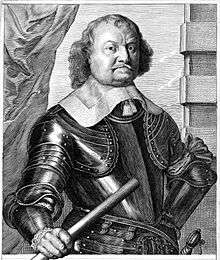Louis Henry, Prince of Nassau-Dillenburg
| Louis Henry, Prince of Nassau-Dillenburg | |
|---|---|
 Louis Henry, Prince of Nassau-Dillenburg (Pieter Philippe) | |
| Spouse(s) |
Catherine of Sayn-Wittgenstein Elisabeth of Salm-Dhaun Sofie Magdalene of Nassau-Hadamar |
| Noble family | House of Nassau |
| Father | George, Count of Nassau-Dillenburg |
| Mother | Anna Amalia of Nassau-Saarbrücken |
| Born |
9 May 1594 Saarbrücken |
| Died |
12 July 1662 (aged 68) Dillenburg |
Louis Henry of Nassau-Dillenburg (9 May 1594 in Saarbrücken – 12 July 1662 in Dillenburg), was Count, and from 1654 Prince of Nassau-Dillenburg. During the Thirty Years' War, he was a senior officer. He climbed to the rank of Major General. Before 1635, he served on the Protestant side; after 1635, he served in the imperial army.
Background
He was the son of the Count George of Nassau-Beilstein and later Nassau-Dillenburg. His mother was Anna Amalie Countess of Nassau-Saarbrücken. In 1616, he married in his first marriage Countess Catherine of Sayn-Wittgenstein (1588–1651). In 1653 he married his second wife Wild- and Rhinegravine Elizabeth of Salm-Dhaun (1593–1656). In 1656, he married his third wife, Sofie Magdalene of Nassau-Hadamar (1622–1658). He had five sons and eight daughters from his first marriage, two of the sons and four of the daughters died early. From his second marriage, he had another three sons, two of whom died early.
Early years
Louis Henry was first educated at the court in Dillenburg and later at Herborn Academy. He then made a Grand Tour to France and the Netherlands. He received his military training under Prince Maurice of Orange-Nassau. As early as 1614, he participated in the relief of Emmerich, which was besieged by the Spanish.
Louis Henry and his brother Albert inherited Nassau-Dillenburg in 1623. They ruled jointly, until Albert died in 1626 and Louis Henry became the sole ruler.
Councillor Hoen and domestic policies
The Emperor had outlawed the Counts of Nassau-Dillenburg and Nassau-Hadamar for allegedly supporting Elector Palatine Frederick V. The Emperor had assigned their possessions to John VIII of Nassau-Siegen. This ruling was never carried out, thanks to the efforts of John Louis of Nassau-Hadamar. Even so, the military occupation of Nassau-Dillenburg from 1622 onwards, put a high strain on his land. Louis Henry saw reducing this damage as his main task. He only played a relatively small rôle himself. Policies were mainly drawn up and carried out by his councillor, the publicist and professor Philipp Heinrich Hoen (Hoenosius). Hoen also administered the county during Henry Louis long periods of absence. He also represented the interests of the House of Nassau and the Wetterau Association of Imperial Counts in the negotiations the led to the Peace of Westphalia.
In Protestant service
Louis Henry initially stood on the side of the Protestant Union. He joined the army of King Gustavus Adolphus of Sweden as a colonel. He led an infantry regiment and later a cavalry regiment. His troops distinguished themselves in various battles, and Louis Henry himself showed personal bravery. He distringuished himself in particular during the storming of fortified cities and fortresses, such as the capture of Braunfels in 1635.
In the imperial service
Later that year, when the war seemed to turn against the Swedes, Louis Henry changed sides and joined the imperial side. He served the emperor as a senior officer and united his forces with those of Landgrave George II of Hesse-Darmstadt. In 1637, he held the rank of Major general and marched into Saxony. He then enjoyed the imperial favour at the court in Prague. In 1654, he was rewarded for his services by being raised to Imperial Prince.
Domestic policies after 1649
After Hoen died in 1649, Louis Henry tried to enforce an absolutist policy in Dillenburg. He was only partially successful. He also attempted to support Herborn Academy, which had been badly affected by the war, but eventually lost interest.
Louis Henry died in 1662. Since his eldest son, George Louis had already died in 1656, Dillenburg was inherited by his grandson Henry.
Family
Louis Henry was married three times. His first wife was Catherine of Sayn-Wittgenstein (1588–1651), the daughter of Louis I, Count of Sayn-Wittgenstein. The couple had the following children:
- Anne (1616–1649), married:
- in 1638 with Count Philip of Wied (d. 1638)
- in 1646 with Count Christian of San-Wittgenstein (d. 1675)
- George Louis (1618–1656), Hereditary Prince of Nassau-Dillenburg, married in 1638 with Augusta Anna, the daughter of Count Henry Julius of Brunswick-Wolfenbüttel
- Elisabeth (1619–1665)
- Juliana (1620–1622)
- Albert (1621–1622)
- Catherine (1622–1631)
- Louise (1623–1665), married in 1646 John Louis of Isenburg-Büdingen (d. 1685)
- Unnamed daughter (1624)
- Henry (1626–1627)
- Magdalena (1628–1663), married in 1662 with Christian Maurice of Isenburg-Büdingen (d. 1664)
- Adolph (1629–1676), Prince of Nassau-Schaumburg, married in 1653 with Charlotte (1640–1707), the daughter of Count Peter Melander of Holzappel
- Philip (1630–1657)
- Zwillige (1631)
- Maria Eleonora (1632–1633)
After Catherine's death, he married Wild- and Rhinegravine Elizabeth of Salm-Dhaun (1593–1656), the daughter of Wild- and Rhinegrave Adolph Henry of Dhaun-Neufviller. However, she died soon after the wedding.
In 1656, he married his third wife. She was Sophie of Nassau-Hadamar (1622–1658), the daughter of John Louis of Nassau-Hadamar. They had three children:
- Augustus (1657–1680)
- Charles (1658–1659)
- Louis (1658-1658)
Ancestors
| Ancestors of Louis Henry, Prince of Nassau-Dillenburg | ||||||||||||||||||||||||||||||||||||||||||||||||||||||||||||||||||||||||||||||||||||||||||||||||||||||||||||||||||||||||||||||||||||||||||||||||||||||||||||||||||||||||||||||||||||||||||||||||||||||||||||||||||||||||||||||||||||||||||||||||||||||||||||||||||||||||||||||||||||||||||||||||||||||||||||||||||||||||||||||||||||||||||||||||||||||||||||||||||||||||||||||||||||||||||||||||||||||||||||||||||||||||||||||||||||||||||||||||||||||||||||||||||||||||||||||||||||||||||||||||||||||||||||||||||||||||||||||||||
|---|---|---|---|---|---|---|---|---|---|---|---|---|---|---|---|---|---|---|---|---|---|---|---|---|---|---|---|---|---|---|---|---|---|---|---|---|---|---|---|---|---|---|---|---|---|---|---|---|---|---|---|---|---|---|---|---|---|---|---|---|---|---|---|---|---|---|---|---|---|---|---|---|---|---|---|---|---|---|---|---|---|---|---|---|---|---|---|---|---|---|---|---|---|---|---|---|---|---|---|---|---|---|---|---|---|---|---|---|---|---|---|---|---|---|---|---|---|---|---|---|---|---|---|---|---|---|---|---|---|---|---|---|---|---|---|---|---|---|---|---|---|---|---|---|---|---|---|---|---|---|---|---|---|---|---|---|---|---|---|---|---|---|---|---|---|---|---|---|---|---|---|---|---|---|---|---|---|---|---|---|---|---|---|---|---|---|---|---|---|---|---|---|---|---|---|---|---|---|---|---|---|---|---|---|---|---|---|---|---|---|---|---|---|---|---|---|---|---|---|---|---|---|---|---|---|---|---|---|---|---|---|---|---|---|---|---|---|---|---|---|---|---|---|---|---|---|---|---|---|---|---|---|---|---|---|---|---|---|---|---|---|---|---|---|---|---|---|---|---|---|---|---|---|---|---|---|---|---|---|---|---|---|---|---|---|---|---|---|---|---|---|---|---|---|---|---|---|---|---|---|---|---|---|---|---|---|---|---|---|---|---|---|---|---|---|---|---|---|---|---|---|---|---|---|---|---|---|---|---|---|---|---|---|---|---|---|---|---|---|---|---|---|---|---|---|---|---|---|---|---|---|---|---|---|---|---|---|---|---|---|---|---|---|---|---|---|---|---|---|---|---|---|---|---|---|---|---|---|---|---|---|---|---|---|---|---|---|---|---|---|---|---|---|---|---|---|---|---|---|---|---|---|---|---|---|---|---|---|---|---|---|---|---|---|---|---|---|---|---|---|---|---|---|---|---|---|---|---|---|---|---|---|---|---|---|---|---|---|---|---|---|---|---|---|---|---|---|---|---|---|---|---|---|---|---|---|---|---|---|---|---|---|---|---|---|---|---|---|---|---|---|---|---|---|---|---|---|---|---|---|---|---|---|---|---|---|---|---|---|---|---|---|---|---|---|---|---|---|---|---|---|---|---|---|---|---|---|---|---|---|---|---|---|---|
| ||||||||||||||||||||||||||||||||||||||||||||||||||||||||||||||||||||||||||||||||||||||||||||||||||||||||||||||||||||||||||||||||||||||||||||||||||||||||||||||||||||||||||||||||||||||||||||||||||||||||||||||||||||||||||||||||||||||||||||||||||||||||||||||||||||||||||||||||||||||||||||||||||||||||||||||||||||||||||||||||||||||||||||||||||||||||||||||||||||||||||||||||||||||||||||||||||||||||||||||||||||||||||||||||||||||||||||||||||||||||||||||||||||||||||||||||||||||||||||||||||||||||||||||||||||||||||||||||||
References
- Gerhard Menk (1987), "Ludwig Heinrich von Nassau-Dillenburg", Neue Deutsche Biographie (NDB) (in German), 15, Berlin: Duncker & Humblot, pp. 403–404
- Ernst Joachim (1884), "Ludwig Heinrich von Nassau-Dillenburg", Allgemeine Deutsche Biographie (ADB) (in German), 19, Leipzig: Duncker & Humblot, pp. 566–567
External links
| Louis Henry, Prince of Nassau-Dillenburg Born: 9 May 1594 Died: 12 July 1662 | ||
| Preceded by George as Count of Nassau-Dillenburg |
Prince of Nassau-Dillenburg before 1654 Count of Nassau-Dillenburg 1623-1662 |
Succeeded by Henry |